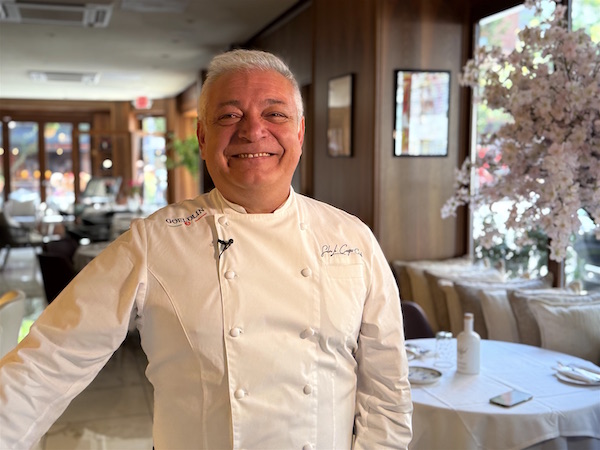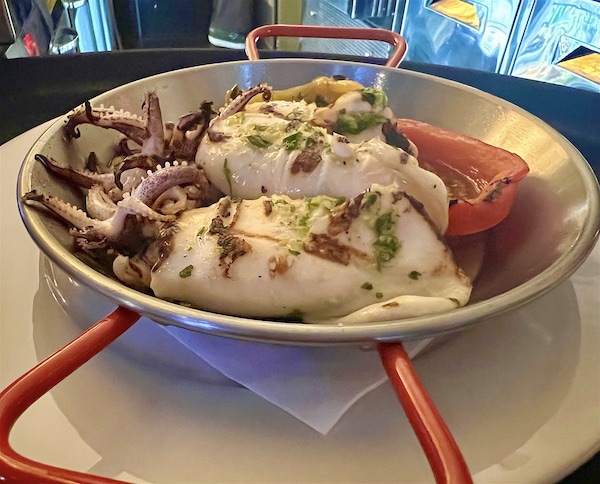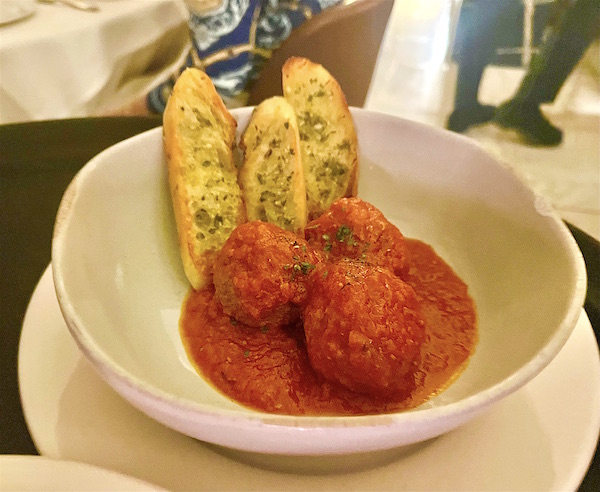
 Chef Salvo Lo Castro has cooked for popes going back to St. John Paul II, but he always wanted to operate restaurants in New York City. Now he does with his CASASALVO restaurant on Spring Street and four similarly named coffee shops elsewhere in Manhattan. (Photos: Bill Miller and Katie Vasquez)
Chef Salvo Lo Castro has cooked for popes going back to St. John Paul II, but he always wanted to operate restaurants in New York City. Now he does with his CASASALVO restaurant on Spring Street and four similarly named coffee shops elsewhere in Manhattan. (Photos: Bill Miller and Katie Vasquez)
SOHO — Chef Salvo Lo Castro made a career preparing exquisite meals for popes and other Vatican officials, and now hopes to bring the same culinary skills and Sicilian hospitality to all who take a seat in his new restaurant.
CASASALVO has been open for a couple of months at 195 Spring St., in the SoHo neighborhood of Lower Manhattan. It is the latest project in this Sicilian chef’s expansion into New York City, which began four years ago with the opening of four similarly named coffee shops.
The shops serve just-brewed coffees and freshly baked pastries. Each has a built-in Italian market that sells old-country items like bags of gourmet coffee beans to take home.
Meanwhile, Lo Castro said, the new restaurant offers a small menu of Italian pasta and meat dishes each night, with influences from Mediterranean spots like Tunisia, Spain, Greece, and Turkey. Everything is made fresh with meats, vegetables, fish, and other ingredients appropriately sourced daily, he said. The chef wants each location to be true to the name. “Casa Salvo” translates to “Salvo’s House.”
“It is my home,” Lo Castro said of the restaurant. “Every night I open the door of my home for my guests.” And each guest is as important as the pope, Lo Castro said. He moves among the tables, greeting each one. “For me, every guest is a king, or queen, or president,” he said.
RELATED: Priests Recall Their Past Lives as a Naval Corpsman, Chef & Actuary
Lo Castro’s workers are also held in high esteem, and he shares a meal with them early each evening at a large table in the dining area before the guests arrive. This chef is from the Sicilian city of Linguaglossa, on the north side of Mount Etna, where snow skiers enjoy views of the balmy Mediterranean Sea below, he said.

Lo Castro’s culinary career began in local restaurants in Sicily before entering culinary school. After graduation, he worked in the kitchens of fancy nearby resorts and popular eateries of Milan, Florence, France, and Brazil, before moving into the Vatican kitchens during the 2000 Jubilee. His first cooking lessons, however, came from his mother and grandmother while helping them prepare for the postMass family lunch each Sunday.
But, much to the youngster’s dismay, preparations took up a big chunk of his Saturdays, especially while making their famous meatball recipe. “It was a traditional recipe from Sicily with beef. No pork,” Lo Castro said. “I looked at my mom and my grandma, and I said, ‘It’s Saturday. Why are you preparing the food today for tomorrow?’ ”
His mother explained that for food to “taste incredible,” it must be cooked slowly. And she offered one more reminder: The secret to the meatballs is not the beef, but the sauce.
“And now,” Lo Castro added, “I repurpose this classical recipe in my restaurant. It is a very big success.”
RELATED: Palestinian Chef Expresses Catholic Identity Through Cooking
The meatballs, as well as other dishes, are pope-approved, Lo Castro said. He said it was a privilege and an honor to cook for them. He is especially fond of Pope Benedict XVI, with whom he spent the most time. That said, he noted with a chuckle that his favorite pope is whoever currently has the job. He has not met Pope Leo XIV, but he is eager to do so.

Lo Castro could’ve stayed in Italy, but he explained that New York City has been his desired location since he was a kid watching movies set in the “capital of the world.”
Although his arrival coincided with the COVID-19 pandemic, he worked steadily at improving his English skills while getting the coffee shops up and running. Even now, in the restaurant’s infancy, he’s not shy about using a smartphone translation app.
Lo Castro confirmed that starting a business in a pricy and competitive restaurant market during a pandemic required guidance from God, and he prays for it daily. He struggled to explain why in English, so out came the phones with the apps.
The translation: “In life,” he said, “it’s not just professionalism and money that matter. If you don’t have God protecting you, watching over you from above, you have nothing.”